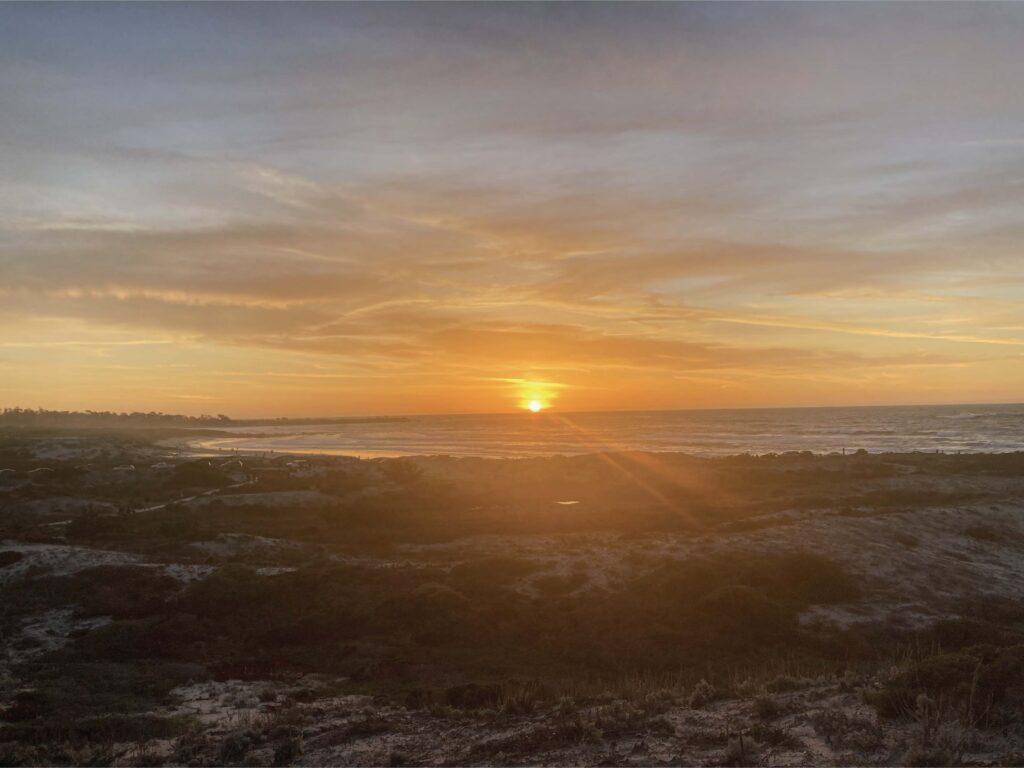Kelsey Grimsley, OFRF Office Manager and Program Administrator, and Brise Tencer, OFRF’s Executive Director, recently attended the 43rd annual EcoFarm Conference. In this blog post Kelsey shares their experience at the conference and some of the highlights from thought-provoking sessions and stimulating conversations happening in the organic and regenerative agriculture world.
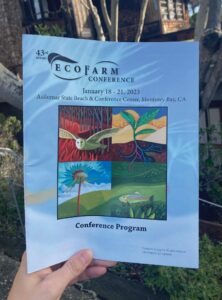 This year was the 43rd annual EcoFarm Conference held at the Asilomar State Beach and conference grounds in Monterey, California. As EcoFarm puts it, this conference “has brought together farmers, ranchers, and food system advocates to advance just and ecological farming and food systems.” It was four days of skill-building workshops, informative speeches, and challenging conversations that spark motivation for action. This was the first in-person reconvening since the January 2020 conference before the pandemic, and as I arrived, there was a noticeable feeling of comradery in the air. People smiled, waved, and were eager to greet each other with what is now becoming a familiar feeling of gratitude to be together in person.
This year was the 43rd annual EcoFarm Conference held at the Asilomar State Beach and conference grounds in Monterey, California. As EcoFarm puts it, this conference “has brought together farmers, ranchers, and food system advocates to advance just and ecological farming and food systems.” It was four days of skill-building workshops, informative speeches, and challenging conversations that spark motivation for action. This was the first in-person reconvening since the January 2020 conference before the pandemic, and as I arrived, there was a noticeable feeling of comradery in the air. People smiled, waved, and were eager to greet each other with what is now becoming a familiar feeling of gratitude to be together in person.
There’s nothing quite like being in-person talking to folks whose minds are engaged in all the big questions that face the regenerative and organic agriculture community. From water management, to land back initiatives, food justice, organic regulation challenges and more, people were ready to discuss their thoughts and experiences with what seemed like less of a filter and more depth than the normal day-to-day chats. This is why I love coming to these conferences!
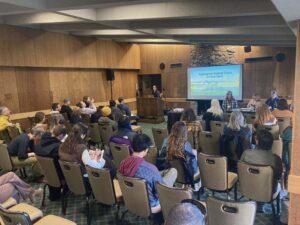 I’m a newcomer to the organic agriculture community, bringing my perspective from having worked in sustainability and environmental policy. I was ready to absorb and listen as I headed to the first session of the day, “An Indigenous Panel: Food Sovereignty, Appropriation, and Landback as Integral Pieces of Organic Farming Systems,” with presenters A-dae Romero Briones, a leading voice in food and land systems, and Samantha Hilborn, Laguna and Acoma Pueblos and an Organic Consultant with the Rodale Institute. This session helped create the perfect lens from which to view and approach the rest of the conference, acknowledging that regenerative and organic agriculture theories were derived from Indigenous practice and knowledge.
I’m a newcomer to the organic agriculture community, bringing my perspective from having worked in sustainability and environmental policy. I was ready to absorb and listen as I headed to the first session of the day, “An Indigenous Panel: Food Sovereignty, Appropriation, and Landback as Integral Pieces of Organic Farming Systems,” with presenters A-dae Romero Briones, a leading voice in food and land systems, and Samantha Hilborn, Laguna and Acoma Pueblos and an Organic Consultant with the Rodale Institute. This session helped create the perfect lens from which to view and approach the rest of the conference, acknowledging that regenerative and organic agriculture theories were derived from Indigenous practice and knowledge.
Next I attended the session moderated by Brise Tencer, OFRF’s own Executive Director. This session was titled, “How to Tap into Federal Funds on your Farm/Ranch.” The presenters included Karen Lowell of NRCS Salinas Station. Stacie Clary of Western SARE, Christopher (Cheetah) Tchudi from TurkeyTail Farm, and Elizabeth Reikowski of Willow Creek Land and Cattle. The discussion was packed with information on all the available avenues of funding. Some suggestions got creative, including my favorite tip coming from Elizabeth to look into CalFire funding for brush and land clearing.
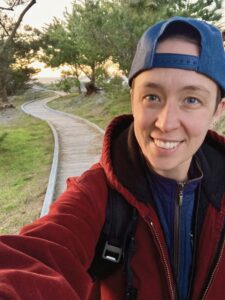 In between sessions there was time to walk the scenic boardwalks of Asilomar State Beach.
In between sessions there was time to walk the scenic boardwalks of Asilomar State Beach.
After a necessary cup of coffee from Cafe Mam and some pleasant exchanges with several exhibitor booths, my second day at the EcoFarm conference kicked off with a session reviewing the changes and challenges from the recently finalized Strengthening Organic Enforcement (SOE) initiative. This session went into detail on the challenges that farmers and producers will face with the new compliance rules. You can read more about the final published rule here.
The final session stop of the conference was the Farm Bill Town Hall co-hosted by OFRF, the National Sustainable Agriculture Coalition (NSAC), Regenerative Agriculture Foundation, and Roots of Change. OFRF Executive Director, Brise Tencer, again moderated the event and introduced the speakers: Representative Jimmy Panetta, Karen Ross of CDFA, and Jenny Lester Moffitt of USDA Agriculture Marketing Service (AMS). I had brought some of OFRF’s soil health guides and general research information for folks to take, all of which were quickly swooped up by the session attendees. If you’d like to read through more information on the Farm Bill, you can find that here.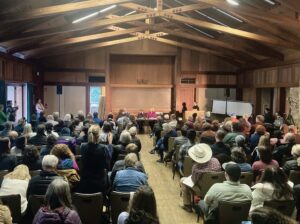
As the Farm Bill session wrapped up, the Organic Agriculture Mixer was beginning. Staff from California Certified Organic Farms (CCOF), EcoFarm, and OFRF set up a space for folks to mingle and converse with music, decoration, and organic libations. This was a chance for folks who had been listening to and absorbing the sessions throughout the week to engage with each other in a more casual environment. Events like the organic mixer seem to create a space with no pressure, where people could exchange thoughts and interact in an authentic way, and converse about the values at the base of our work.
We wrapped up our time at EcoFarm talking about what guides us and our outlooks of the future.
